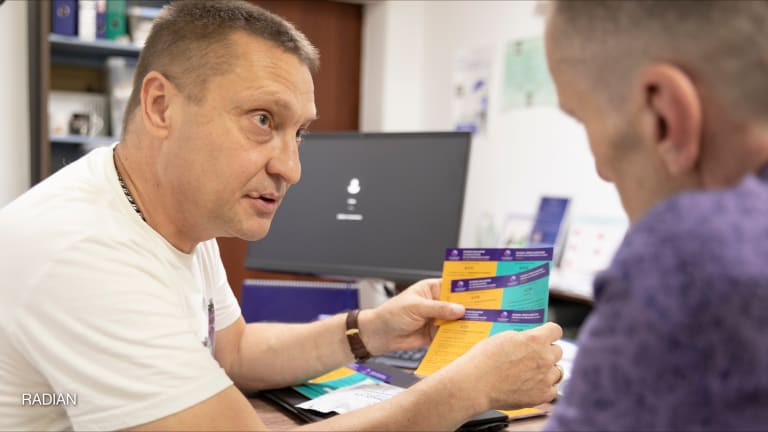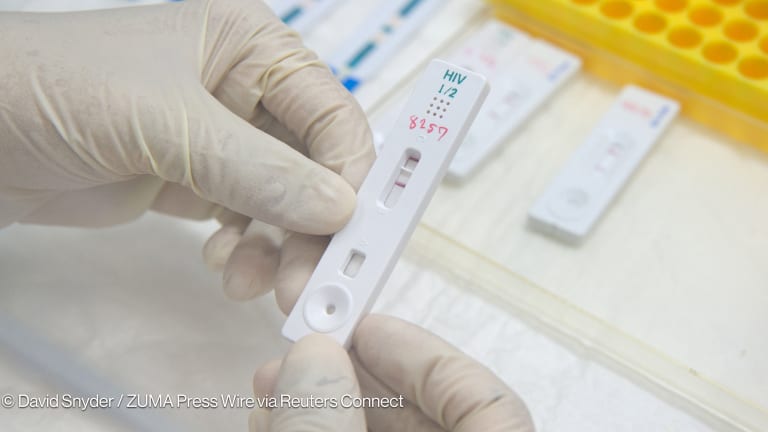
KIGALI, Rwanda — More people living with HIV are now accessing antiretroviral treatment, or ART, than ever before. The Joint United Nations Programme on HIV/AIDS, known as UNAIDS, reports that in 2018 approximately 61% of the 37.9 million people living with HIV globally are on treatment — more than three times as many as in 2010. Scale-up of treatment has seen deaths from advanced HIV disease, or AHD — commonly called AIDS — decline from a peak of 1.7 million in 2004 to 770,000 in 2018.
However, despite significant expansion of antiretroviral therapy with the “test and treat” strategy, “global reductions in HIV infections and AIDS-related deaths are getting smaller year-on-year,” according to a 2019 UNAIDS report. The same report also states that reaching the 2020 milestone of fewer than 500,000 deaths annually will require further declines of about 135,000 deaths per year.
“There has been a lot of investments by the funders for point-of-care instruments already in Africa — don't let those investments go to waste.”
— Pam Pillay, HIV marketing director for Africa, Abbott“Countries are still ill-equipped to detect and treat people suffering through advanced stages of the disease,” Médecins Sans Frontières said in a press release for a report on AHD in 15 countries, released on Dec. 1 for World AIDS Day.
The report noted that “funding and access to commodities for AHD remain extremely limited” and that significant gaps in the implementation of the minimum package of care for AHD means “many opportunities to reduce avoidable mortality are being missed.”
It also called for “a focus on and a drastic acceleration of measures to decrease mortality,” through the planning, funding, and implementation of the World Health Organization’s package of screening, prophylaxis, and treatment for major opportunistic infections, or OIs, such as tuberculosis and cryptococcal meningitis.
Although some high-income countries have done “a decent job of getting people on antiretroviral therapy, finding them early … and reducing the burden of advanced disease” hasn’t happened in large parts of the world, said Dr. Tom Chiller, chief of the mycotic diseases branch of the U.S. Centers for Disease Control and Prevention.
The role of CD4 testing in identifying patients with AHD
A CD4 test is used to measure the number of T cells — a type of white blood cell — in a patient's blood and indicates the strength of their immune system and hence their ability to protect against OIs. According to WHO guidelines released in 2017, people ages 5 and up who are living with HIV are considered to have AHD if their CD4 count is below 200. Worldwide, an estimated 33% of people who test positive for HIV start treatment with a CD4 count below 200.
Because around 50% of people living with HIV and AHD are asymptomatic when presenting to care, clinical evaluation is not a reliable way to determine if a patient has AHD. This makes CD4 testing the gateway for the WHO-recommended package of care and thus a critical component of quality HIV care.
Many patients re-presenting to care after a period of disengagement “don’t appear sick to you when you see them, and knowing whether or not they have a low CD4 count is extremely helpful,” said CDC’s Chiller.
Despite this essential role for CD4 testing, “recent shifts in the global HIV response have driven rapid changes in the prioritization and use of these tests,” according to a policy paper authored by the Bill & Melinda Gates Foundation, Clinton Health Access Initiative, and WHO, among others. Much of this has been driven by a strong focus on scale-up of HIV viral load testing, which measures the amount of HIV in the blood. Viral load is an essential test for monitoring response to ART but does not measure the strength of the immune system.
Chiller says that “controlling the virus and stopping transmission by monitoring viral loads is one of the essential strategies to control the spread of the epidemic.” However, “the virus isn’t killing people,” he said, adding that instead it’s the damage to the immune system that makes people susceptible to the OIs that can ultimately kill them.
The funding landscape
Since its inception in 2003, the U.S. President’s Emergency Plan for AIDS Relief has invested over $85 billion in the fight against HIV and has saved over 18 million lives. According to Dr. Deborah L. Birx, the U.S. global AIDS coordinator and American ambassador-at-large who leads PEPFAR, we need to avoid generalizations and get a subnational, district-level understanding of what’s driving mortality.
“What Rwanda may need — relevant to advanced disease — is very different than what Côte d’Ivoire will need, but the fact that Côte d’Ivoire needs more support for advanced disease is a failure of our programs,” she said.
This means that people haven’t been diagnosed in time, or that people have left medical services and returned with advanced disease, Birx said. She urged the international community “to ask ourselves not only how we are dealing with advanced disease, but how we are preventing advanced disease.”
In the PEPFAR Country Operational Plan 2020, which is currently still a draft, “you’ll hopefully see an entire section on advanced disease and how we would incorporate CD4 in advanced disease analysis,” Birx said.
At ICASA 2019, the Global Health Impact Group and industry partners co-hosted a satellite symposium on AHD in Africa. Alex Jordan, a cryptococcal screening coordinator at CDC’s mycotic diseases branch who was a panelist at the symposium, said he was “happy” to see increased language around advanced disease package of care implementation in recent years. However, “none of the countries our group is working with currently are actually getting CD4 provided by PEPFAR, but they do have CD4 capacity via The Global Fund,” he said.
The MSF report also highlighted the lack of firm recommendations from donors such as PEPFAR and The Global Fund to procure commodities for diagnosis, prevention, and treatment of common OIs as one of the reasons for why countries have been slow to adopt WHO guidelines for AHD.
Challenges implementing WHO’s AHD package
Countries continue to face challenges implementing WHO’s package for AHD, including CD4 testing — much of them due to changes in the prioritization and use of these tests. There is not much that has been set aside for CD4 testing from funders like The Global Fund, noted Raiva Simbi, deputy director at Zimbabwe’s Ministry of Health and Child Care. Currently, around 15% of the country’s HIV patients are CD4 tested, he said.
The country is suffering from a financial crisis and hyperinflation — currently estimated at around 500% — which has had severe consequences for its health system.
Zimbabwe has managed to extend its CD4 network in recent years, “but because now there is no funding, it becomes archaic and obsolete, and the moment that you want to start afresh it is like you are starting a new program and again the investment goes down the drain,” Simbi added. However, he acknowledged the huge investment from various partners and the government on the procurement of CD4 machines.
Supporting CD4 testing in-country
According to Nqobile Ndlovu, CEO of African Society for Laboratory Medicine — a nonprofit organization mobilizing stakeholders to improve local access to diagnostic services — it’s important to understand how to best place machines where they are most needed. “Let’s look at where these instruments are, let’s compare with the demand and the needed testing, and begin to move them around so that we can begin to optimize what we have,” he said.
Simbi also called for more support and funding for the machines they already have. “Zimbabwe has over 300 conventional CD4 testing machines, but now some of them are just sitting and not doing anything,” he said, adding that some service contracts have expired.
For CD4 testing, several point-of-care technologies are currently available from providers such as Abbott and BD, and newer, instrument-free POC solutions are underway. BD representative Daniel Bitoun, senior regional marketing leader for Europe, Middle East, and Africa at BD Life Sciences, said during the ICASA session that the company has a program to replace broken or outdated machines across Africa with POC technology. “This is our own responsibility,” he said.
Abbott’s Pam Pillay, HIV marketing director for Africa, said that her company was engaging with Unitaid and others “to look at how we can provide all-in offerings for instruments,” adding that the company has been investing in refurbishing machines at their own cost to make sure they work. Pillay also said that optimizing existing machines will be crucial. “There has been a lot of investments by the funders for point-of-care instruments already in Africa — don't let those investments go to waste," she said, urging the community to work together to ensure a return on those investments and to “programmatically realize the impact of every CD4 [test] that's run.”
As a response to the session, a youth advocate from Nigeria shared her community’s perspective, highlighting cost and lack of understanding as the main barriers for patients.
“You talk about technology. But to me, I think people need more knowledge about CD4 and viral load, because most of the time if you go to the facility to access this treatment, they charge us a fee, which we can't afford to pay, and we end up taking the viral load test only. So, what can we do to eliminate these challenges?”
A lack of understanding of CD4 testing means neither patients nor clinicians are demanding them.
“The biggest challenge we have now is the demand creation for the CD4. The clinicians are not asking for CD4 [tests],” Simbi said.
Putting the patient at the center of AHD testing and treatment will be important if we are to decrease mortality. CDC’s Chiller thinks organizations need to stop working in silos if we are to effectively tackle AHD.
“We’ve got to think of the patient first and then all the diseases that that person presents second,” he said.
A 2018 study on AHD management suggested that “an increasing number of patients re-present to care at an advanced stage of HIV disease following a period of disengagement from care.” This means patients have already been on ART but are “either failing them because they stopped taking them, or they’re failing them because they have a resistant virus,” Chiller said.
Need for increased collaboration and coordination
According to Chiller, collaboration is essential to identifying patients with AHD and providing them with the package of care that can accelerate declines in AIDS-related mortality. “We don’t have all the resources that we need, so we need to collaborate, we need to work together,” he said. The global health community needs to utilize the assets and technologies that we have and integrate them, Chiller added.
“We want to see integration happening right from the global partners; let’s talk to each other and begin to plan together, even when it comes to implementation at the country level,” he said.
The need to ramp up efforts to tackle AHD was the focus of several sessions at this year’s ICASA, including a session on differential service delivery for AHD and a workshop looking at how to implement the WHO package of care. Actors across the global health spectrum committed to work together to maximize resources and efforts, and ultimately, to reduce the number of people dying from AHD.








